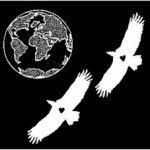In 1991 we organized a conference in Bechyne, Czechia, with the title: The Challenge of Unity, where we developed a vision for the future. This vision was published in Earth Fever (Judy McAlliser, Erik van Praag, Jan Paul van Soest, 2009). Today it is (unfortunately) as topical as ever, and it deserves attention once more. That’s why I publish it below.
Just imagine a society in which life is sober but yet full of celebration. One in which it matters to us not just how we ourselves are, but also how our brothers and sisters all over the world are, including all those who come after us. One in which we know we are part of nature, feeling her suffering ourselves, and also aware of her beauty and power. A society in which we , like Francis of Assisi, see animals as our brothers and sisters. A society, in which we quite naturally enjoy our contributions in work, education or in any other way in which we can express and develop ourselves fully. A society of liberty, equality and brotherhood/sisterhood, in which extreme differences in income and wealth are diminished and everyone has enough to live a joyful life. A society in which women have take their rightful position. A society without guilt, because we are connected with our deeper knowing and so personally and together go for the best choices we can see.
A society in which most of us let ourselves be guided by common sense, knowing that we are guided and supported by an invisible and transcendent world. A society in which indifference has given way to caring, with all the good feeling that come with it. A society without unnecessary fear, because we learned to live with the uncertainties of life itself, and know that suffering and death are not the final truths. A society based on faith, hope, love and courage. And, finally, a society that is characterized by one word: Unity. Between you and me, us and Gaia, us and the Cosmos.
In such a society the greenhouse gas emissions that are caused by humans will have bene diminished to almost nothing, because the knowledge of the consequences is then widespread, and we won’t do that to Gaia and ourselves.
In this society there will still be grief, illness and suffering, because these are intrinsic to life itself. This society won’t be perfect, because we aren’t perfect. There will always be people, who stray away form the ideal just described, who want to have what belongs to others, people who will commit crimes. However the society will have developed a legal system, and a health system, that deal with these problems with compassion and clarity. This society is a democratic one whose inspiring leaders are connected with what is on people’s minds and hearts. Our role as citizens will be balanced with our role as consumers and shareholders. In such a society we are connected with our own dignity, and with the gratitude that we are living in this magnificent, challenging, exciting, beautiful lifetime.
 An utopia? Or a feasible vision, an alternative to the collapse of the present feverish world? Maybe the world that we’ve painted is not your ideal world, but there’s nothing to stop you from dreaming your own dream.
An utopia? Or a feasible vision, an alternative to the collapse of the present feverish world? Maybe the world that we’ve painted is not your ideal world, but there’s nothing to stop you from dreaming your own dream.
Due to holiday the next blog shall appear not until July 21st!

 Afgezien van de weerzinwekkende toon waarop het debat werd gevoerd, werden de campagnes gekenmerkt door doemscenario’s, zowel bij de voorstanders van blijven als bij de voorstanders van Brexit. Wat ik heb gemist is een visie, een wenkend perspectief op een toekomst die het waard is om voor te gaan. Aan de blijven-kant was het enige argument economische groei* en meer van hetzelfde neo- liberale, hardvochtige en uit de hand gelopen kapitalisme en globalisme, en aan de Brexit kant een nostalgisch terugverlangen naar het oude ‘Britannia, rule the waves’ (een lied uit 1740!), waarbij men tegelijkertijd een knus en raszuiver eigen volk zou beschermen door vreemdelingen te weren (De Engelsen hebben een lange traditie van discriminatie, tegenover Indiërs en Joden bijvoorbeeld, al liep het nooit zo uit de hand als bijvoorbeeld in Polen en Duitsland). Zou je deze weinig aantrekkelijke alternatieven met enige moeite nog als positief kunnen kenschetsen, in de campagnes lag de nadruk op de rampen die Engeland zouden treffen als de andere kamp zijn zin zou krijgen.
Afgezien van de weerzinwekkende toon waarop het debat werd gevoerd, werden de campagnes gekenmerkt door doemscenario’s, zowel bij de voorstanders van blijven als bij de voorstanders van Brexit. Wat ik heb gemist is een visie, een wenkend perspectief op een toekomst die het waard is om voor te gaan. Aan de blijven-kant was het enige argument economische groei* en meer van hetzelfde neo- liberale, hardvochtige en uit de hand gelopen kapitalisme en globalisme, en aan de Brexit kant een nostalgisch terugverlangen naar het oude ‘Britannia, rule the waves’ (een lied uit 1740!), waarbij men tegelijkertijd een knus en raszuiver eigen volk zou beschermen door vreemdelingen te weren (De Engelsen hebben een lange traditie van discriminatie, tegenover Indiërs en Joden bijvoorbeeld, al liep het nooit zo uit de hand als bijvoorbeeld in Polen en Duitsland). Zou je deze weinig aantrekkelijke alternatieven met enige moeite nog als positief kunnen kenschetsen, in de campagnes lag de nadruk op de rampen die Engeland zouden treffen als de andere kamp zijn zin zou krijgen. Dit zijn alle opmerkelijke en overtuigende fenomenen, die mijns inziens maar tot één conclusie kunnen leiden: het bewustzijn is te zien als een eindeloos veld, dat zich niet tot een bepaalde plaats beperkt. Van Lommel spreekt van een non-lokaal bewustzijn in een niet plaats gebonden ruimte. Grappig dat hij hierbij langs wetenschappelijke weg tot eenzelfde conclusie komt als de filosoof Teilhard de Chardin die het concept noösfeer heeft gemunt (Het verschijnsel mens, 1958).
Dit zijn alle opmerkelijke en overtuigende fenomenen, die mijns inziens maar tot één conclusie kunnen leiden: het bewustzijn is te zien als een eindeloos veld, dat zich niet tot een bepaalde plaats beperkt. Van Lommel spreekt van een non-lokaal bewustzijn in een niet plaats gebonden ruimte. Grappig dat hij hierbij langs wetenschappelijke weg tot eenzelfde conclusie komt als de filosoof Teilhard de Chardin die het concept noösfeer heeft gemunt (Het verschijnsel mens, 1958). the humiliation of Palestinians (also children) at the numerous checkpoints, the extension of the settlements, the aggravation of the economic conditions, the violation of international law – it all is happening at a much higher frequency and greater scale then years ago. A two state solution has become impossible, due to the enormous amount of Israelian settlements on the West Bank (on Palestinian territory!). And the interesting thing is that Europe, the US and some Arabic states make this all possible, because they are financing the Palestinian authority and its institutions.
the humiliation of Palestinians (also children) at the numerous checkpoints, the extension of the settlements, the aggravation of the economic conditions, the violation of international law – it all is happening at a much higher frequency and greater scale then years ago. A two state solution has become impossible, due to the enormous amount of Israelian settlements on the West Bank (on Palestinian territory!). And the interesting thing is that Europe, the US and some Arabic states make this all possible, because they are financing the Palestinian authority and its institutions.